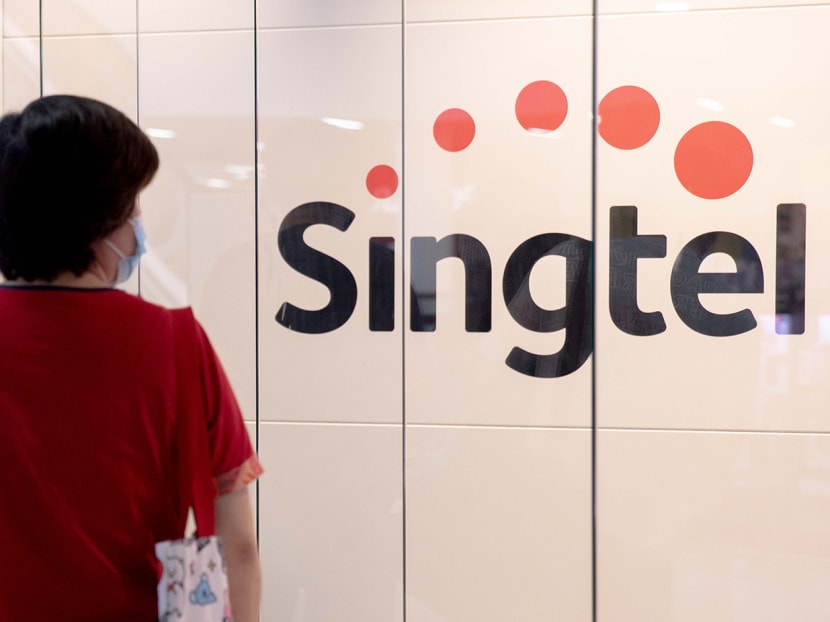Singtel’s full-year profit falls to lowest since at least 1998; firm unveils 'strategic reset’ focused on 5G, digitalisation
SINGAPORE — Singtel on Thursday (May 27) posted its lowest full-year net profit since at least 1998 as the bottom-line sank 49 per cent to S$554 million, mainly owing to S$1.18 billion in exceptional charges relating to the reduced value of some firms it has invested in.

Singtel said it would be embarking on a "strategic reset" to capitalise on the mass digitalisation by many enterprises amid the Covid-19 pandemic.
- Singtel recorded its weakest net profit for more than two decades
- The bottomline was dragged down by S$1.18 billion of impairment charges
- These charges related to the reduced value of some of Singtel’s investments
- The telco is embarking on a strategic reset, focusing on the mass move by firms to digitalise
SINGAPORE — Singtel on Thursday (May 27) posted its lowest full-year net profit since at least 1998 as the bottom-line sank 49 per cent to S$554 million, mainly owing to S$1.18 billion in exceptional charges relating to the reduced value of some firms it has invested in.
Along with the release of its results for its financial year ending March 31, 2021, Southeast Asia’s largest telecommunications company also unveiled a new strategic direction focusing on 5G technology and developing new growth engines in information and communication technologies, as well as digital services.
Singtel Group’s chief executive officer, Mr Yuen Kuan Moon, said the “strategic reset to drive recovery and growth” would focus on the rush by enterprises to “digitalise and transform their businesses” amid the Covid-19 pandemic.
Singtel’s underlying net profit, which excludes the exceptional charges, also took a hit, falling 30 per cent to S$1.73 billion from the previous financial year.
The impairment charges related to two of its investments, digital marketing firm Amobee and cyber security company Trustwave, among others.
Mr Yuen, who took over the helm at Singtel in January this year, said that the results are “disappointing given unprecedented headwinds from Covid-19 and ongoing structural challenges”.
The board is also recommending a final ordinary dividend per share of 2.4 cents, bringing the total ordinary dividend per share for the year to 7.5 cents, which represents a payout ratio of 71 per cent of underlying net profit.
Singtel’s chief financial officer, Mr Arthur Lang, said it plans to pay dividends of between 60 and 80 per cent of underlying net profit, a change in previous policy in the first half of the financial year where about 100 per cent of the company’s underlying net profit was paid out.
When asked about the change in policy, Mr Yuen said the dividend policy has to be sustainable in the long-term.
“The reason is because we are going into a high capital investment cycle in the telco business where we are looking at 5G and next-generation digital infrastructure that we are building. And therefore, we will need to continue to invest for the future for growth,” he said.
Elaborating on Singtel’s new strategic direction in a press briefing, Mr Yuen said that it will take a couple of years to execute plans to transform the company.
Mr Yuen said that Singtel plans to realign its core business to drive for 5G market share in the consumer and enterprise segments in Singapore and Australia.
Riding on the global trend of increasing digitisation brought about by the Covid-19 pandemic, NCS, an ICT company under Singtel, would be expanding to capture new business from the private sector, as well as markets outside of Singapore, he added.
NCS' focus was mainly on digitising the public sector in Singapore.
Another area of focus would be to capitalise on the growing digitalisation of member countries of the Association of Southeast Asian Nations (Asean).
Mr Yuen said Singtel would be “going multi-local” where it will work with its regional associates to build a local digital ecosystem, as this would allow investments to scale faster and crystalise value sooner than if the company were to enter the market on its own.
“The digital playbook has changed and evolved. It is not just about very quickly getting to profitability in the short term. It's about building a digital ecosystem, leveraging on our customer engagement and our access to customers and the trust of the brands in each of the local markets,” he added.
Mr Lang added that this new approach of Singtel being a minority shareholder partnering with associates is different from the past, where the company would have majority or even full control.
He said that Singtel would focus on investing in digital services companies in financial services and digital media, which includes gaming.
As part of its new strategic revamp, Singtel would also be looking to leverage its infrastructure assets, which include towers, satellites, subsea cables and data centres, to unlock latent value.
It has already begun a partial sale of its Optus mobile phone towers in Australia. Optus is a telecommunications company wholly owned by Singtel.
Singtel released its results before the stock market opened on Thursday. Its share price fell one cent or 0.4 per cent to close at S$2.45 on Thursday.
In early 2020, before the pandemic hit, the counter was trading at about S$3.30 before sinking to about S$2.03 on Oct 30 last year, and rebounding somewhat since then.











